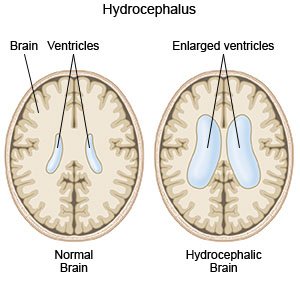Hydrocephalus in Children
Medically reviewed by Drugs.com. Last updated on Aug 4, 2025.
Hydrocephalus is a condition caused by too much cerebrospinal fluid (CSF) inside the ventricles of your child's brain. Ventricles are spaces inside the brain where cerebrospinal fluid (CSF) is produced. CSF surrounds your child's brain and spinal cord. CSF is constantly being made and absorbed by your child's body. It moves through ventricles before it drains out and gets absorbed into the bloodstream. When CSF cannot drain properly, the fluid pressure may cause the ventricles to swell.
 |
DISCHARGE INSTRUCTIONS:
Call your local emergency number (911 in the US) if:
- Your child has a seizure.
Seek care immediately if:
- Your child has a bulging fontanel (soft spot on the top of his or her head).
- Your child's headache is getting worse, even after you give him or her pain medicine.
- Your child has trouble hearing, talking, or seeing.
- Your child has problems walking or weakness in an arm or leg.
- Your child is vomiting and cannot keep any liquids down.
Call your child's doctor if:
- Your child has a fever.
- Your child becomes more fussy, restless, or sleepy than usual.
- Your child seems confused or does not know family or friends.
- You have questions or concerns about your child's condition or care.
Treatment options
The following list of medications are related to or used in the treatment of this condition.
Medicines:
- Medicines may help decrease the swelling in your child's brain or treat a bacterial infection.
- Give your child's medicine as directed. Contact your child's healthcare provider if you think the medicine is not working as expected. Tell the provider if your child is allergic to any medicine. Keep a current list of the medicines, vitamins, and herbs your child takes. Include the amounts, and when, how, and why they are taken. Bring the list or the medicines in their containers to follow-up visits. Carry your child's medicine list with you in case of an emergency.
Follow up with your child's doctor as directed:
Write down your questions so you remember to ask them during your child's visits.
© Copyright Merative 2025 Information is for End User's use only and may not be sold, redistributed or otherwise used for commercial purposes.
The above information is an educational aid only. It is not intended as medical advice for individual conditions or treatments. Talk to your doctor, nurse or pharmacist before following any medical regimen to see if it is safe and effective for you.
Learn more about Hydrocephalus
Treatment options
- Medications for Brain Anomalies incl Congenital
- Medications for Central Nervous System Disorders
- Medications for Hydrocephalus
Care guides
Symptoms and treatments
Further information
Always consult your healthcare provider to ensure the information displayed on this page applies to your personal circumstances.
